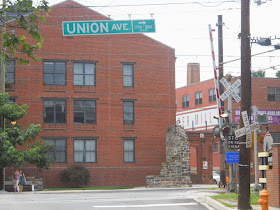The history of Hampden-Woodberry is all around us. Most
of the new development that has come to the pipeline recently actually
hasn't been new at all. It has been the restoration of the Mills that
were once the major Employers of the Mill Villages that would become
Hampden-Woodberry. It wasn't until recently that the Mills were thought
of as assets to the Neighborhood, in fact it was quite the contrary. The
Mills were old blighted and boarded up.
36th St. or the Avenue was and still is the piece de
resistance of Hampden. Woodberry seemed to be worlds away as it was not
only west of Falls Road but also west of the JFX. It should be
mentioned that before the JFXs construction, Hampden and Woodberry were
seamlessly together. As the Avenue began breathing new life into
Hampden, it seemed that the Light Rail Stop was worlds away. After all,
it was in Woodberry which at the time was in the middle of nowhere and
the Avenue was in Hampden. Of course the Light Rail Stop is just a few
blocks away from the Avenue but given the "no man's land" status of the
Light Rail Stop and that it was near the vacant mills, very few utilized
it.
The Real reason the Light Rail Stop wasn't used by
Hampdenites, was because it just wasn't that walkable. Given the fact
that many new Residents in Hampden don't have cars and/or prefer
walking, there had to be a way to connect the Light Rail Stop to the
Avenue. It was then that the Shuttle Bug was conceived. The Shuttle Bug
improved Hampden's walkability by immeasurable proportions. The Shuttle
Bug runs through Hampden and Woodberry with stops on the main roads and
intersections Hampdenites better access to the Light Rail Station,
something that was lacking before hand. This also breathed new life into
Hampden west of Falls Road still closer to the Light Rail Station. This
made the walk under the JFX to get to the Light Rail Station and
Woodberry a little less scary.
As vacant row homes in Hampden began to be occupied
again, the demand for housing, retail, and office space remained. There
isn't much room for new construction so developers had to look at other
options. They began to look at the possibility of rehabbing the old
Mills that had provided employment the area for generations prior. The
interest generated by rehabbing the Poole & Hunt Complex (renamed
Clipper Mill) as mixed use sparked not only new construction on the
site, but it allowed developers to pursue rehabbing other Mills in the
area.
As the 2000s turned into the 2010s, Union Mill,
Meadow Mill, Mount Vernon Mill 1&4, and Clipper Mill (the real one)
were slated for reuse as mixed use development projects. This provided
the much needed link between the Avenue and the Woodberry Light Rail
Stop. This coupled with the Shuttle Bug gave Hampden its own Light Rail
Stop. Although the distance between the Avenue and the Light Rail Stop
hadn't changed, the only thing that had changed was its walkability. The
rehabbing of the Mills created a welcoming environment full of life and
lots of foot traffic all around the Light Rail Stop which encouraged
more Residents to use the Light Rail Stop whether they walked there or
took the Shuttle Bus. The Walkability is what ultimately reunited
Hampden-Woodberry even with the JFX.
When looking in the future to make more
Neighborhoods or Neighborhood clusters walkable, look no further than
Hampden-Woodberry, the Gold Standard.







Meadow Mill was reutilized well before Clipper Mill ever was. It's been offices, etc since 1992, when it was reutilized.
ReplyDelete